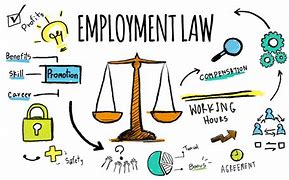Below is a review of the posts on Facebook and LinkedIn from the past week. You can check out the full posts by clicking on the links.

The post on Sunday 12/15/2024 told us that recent layoff/callback litigation underscores perils employers face from every direction. You (should) know that employers cannot use race or ethnicity as a factor in employment decisions. And you (should) also know that if employment decisions — including whom to terminate during a round of layoffs — disproportionately affect one class of workers, the decisions may lead to discrimination claims. So what that means is that employers looking at year-end layoffs should carefully decide which employees they intend to let go.
The rise of DEI programs has brought more traditionally underrepresented minorities into the workplace in recent years. But, in turn, that puts them at particular risk when employers use a “last-in, first-out” basis when looking at layoffs. It’s a Catch-22 as explained in the post. One example is a 2021 lawsuit brought by a former Novant Health Executive VP, whom the hospital network terminated even though he had strong performance reviews and had garnered national recognition for the company’s marketing program. Novant had let go Duvall, who is white, as it was rolling out a DEI program. Duvall was temporarily replaced with two women, one Black and one white, before filling the position with a Black woman. Duvall sued in federal court, alleging Novant violated Title VII as well as state law. The results of the 2021 jury trial and after are in the post.
And then there was the Nov. 2024 EEOC announcement of a $250K settlement with Hooters over allegations it failed to consider characteristics that disproportionately affect a protected demographic group. See the post (and our post of Wed. 11/20/2024) for details.
Especially where an employer has a facility or department with a higher concentration of employees from protected classes, it should carefully look at whether the closure (or layoffs) could lead to an adverse inference of unlawful discrimination. There are some steps employers can take to minimize disparate treatment claims involving layoffs. The first is to develop and use objective, specific criteria when deciding who to lay off. The decision is NOT just telling supervisors that they need to cut a certain number of people — because that might result in various underlying issues such as those listed in the post. Other things an employer can do, including using performance as a basis for layoffs, are described in the post. Who should be looking at the factors and making the layoff decisions is also in the post.
And finally, employers must keep in mind that laid-off workers also can make disparate-impact claims under the ADA and ADEA.
TAKEAWAY: Know the law – what you can take into consideration for layoffs and what will get you in trouble. Involve an employment lawyer early in the process.

The post on Monday 12/16/2024 asked: How different will Trump be for HR? 5 areas to watch. Note that the post came out pre-election, so just pay attention to half of it now.
Labor activity – expectations are for a slowdown of pro-union efforts. There is almost definitely going to be changes to the leadership of the National Labor Relations Board. The current general counsel is expected to be a casualty on Day 1 of the incoming Administration. The effect that will have is noted in the post.
Immigration – any change to federal immigration policies has a direct impact on compliance, hiring and more. One example is worksite enforcement. See the post for what is expected there. The basis for that is that Republicans are expected to concentrate on “supply side” enforcement (defined in the post). There is also another area under immigration (noted in the post) where changes are expected – and those changes will create a chokehold on hiring in the industries listed in the post. That, in turn, could lead to a domino effect for another segment of our society (yes, see the post).
Personnel – political appointee resignations are expected en masse. And will be accepted. And for those who don’t resign? See the post.
Current legal challenges – at least a half-dozen significant challenges to employment law proposals from the Biden administration are currently tangled up in court — including those listed in the post (at least one of which surely affects your business). It is expected that the new Administration will halt the pending appeals. But what about those cases where a (federal) district court issues a decision prior to the inauguration? See the post.
Finally, employers should keep an eye on various state initiatives: ballot initiatives, legislative proposals and legal challenges. There might be a bit less of an effect here than if Harris had won the election for the reason noted in the post.
Areas to keep an eye on include: wage and hour, the FLSA tip credit, paid leave, AI regulation, and labor management relations (each of which is discussed in the post).
TAKEAWAY: the statutes, policies and regulations employers are now used to may be changing, and in some cases changing drastically, in a few weeks. Know the law.

The post on Tuesday 12/17/2024 noted condo board bans personal trainer, insists all residents go through one company. Is that allowed? The resident at issue was using a trainer who worked for a previous company but now contracts directly through the trainer (and wants to continue doing so). But the management company threatened to have the trainer removed from the property if the resident continues to (admit him as a guest and) use him. The residents wants to know if the HOA can do this.
The first place to look when confronted with a question like this is whether there is anything relevant in the declaration of covenants. It is likely nothing is there, but rather one or more provisions of the rules/regulations might apply, especially if the training is taking place in common areas. And then another question arises – whether the rule is “reasonable.” See the post for more on this.
It should also be noted that the trainer here is not really a guest, but more like a vendor if he is being paid (and the training is not in the person’s unit). There might well be legitimate reasons the HOA might want to regulate this – some as discussed in the post. But there also might be reasons that are not reasonable (as also discussed in the post). One of the legitimate reasons can easily be resolved in the manner noted in the post.
TAKEAWAY: Community associations have much authority to restrict or regulate many things within the community, but not everything. Contact a community association lawyer with specific questions.

The post on Wednesday 12/18/2024 reminded us that employers cannot require proof of validity for religious accommodation requests. The EEOC recently announced a settlement in a lawsuit it had filed against a Pennsylvania debt collection agency alleging failure to provide a religious accommodation under Title VII. The suit claimed that the employer refused to allow the employee unpaid time away from work after he failed to provide certification from a religious leader or religious organization demonstrating that the request was a legitimate requirement of his professed religion. The reason the employee resigned is noted in the post. The settlement includes the company paying $60,000 and other non-monetary relief as noted in the post. The EEOC stated that an employee’s sincerely held religious belief entitles them to accommodation even without verified by a third party.
But what if the employer questions the sincerity of an employee’s purported religious beliefs? A not uncommon example is when an employee whose request for vacation time for a beach trip is denied and then requests the same time off for religious observation purposes. Details about how this could play out are in the post. The reality is that employers usually will need to take the employee at his or her word relative to their religious beliefs and instead focus on whether the accommodation will be an undue hardship for the business. What can happen if an employer disputes that the beliefs are not legitimate or sincere is in the post
TAKEAWAY: Religious accommodation requests are on the rise, so employers must know how to deal with them. Consulting an employment lawyer is a good idea.

In the post on Thursday 12/19/2024 we saw that DOJ announces settlement with Chicago Cubs over alleged ADA violations at Wrigley Field. DOJ’s Civil Rights Division said that the ADA requires sports venues like Wrigley Field to be accessible to people with disabilities. They also applauded the settlement.
The suit was filed in 2022 against the Cubs, alleging that its organization’s renovation and reconstruction of Wrigley Field discriminated against individuals with disabilities by failing to provide wheelchair users with adequate sightlines as compared to standing patrons and other things as listed in the post. Under the settlement, the Cubs will make numerous remediations to the facility, including removing noncompliant wheelchair spaces and companion seats and replacing them with wheelchair spaces that have significantly improved views of the field and fully compliant sightlines. What parts of the stadium will be remediated and how is detailed in the post (along with the training to be required of all Cubs employees and contractors with patron contact. Continuing court oversight will be as noted in the post.
TAKEAWAY: This is a good reminder that the ADA affects more than employment, but also access to your business too. Know the law!

The post on Friday 12/20/2024 told us a Board member sues her own HOA for ‘improperly’ towing her brother’s car — and now they want to vote her out. Living in an homeowner’s association (HOA) can be a struggle or a true joy – but from regulating garden gnomes to paying sometimes outrageous fines, it is indeed a controversial subject. Homeowner (and condominium) associations are often at the intersection of petty disputes and dramatic investigations. This is one story on the fringes.
The Board member here said that the property manager improperly towed her brother’s car; no notice was posted but then the manager made it worse (see the post). It does not appear that this woman’s experience is based on any miscommunication. Rather, the car was towed in a way that violated the HOA’s rules and regulations. The woman tried to resolve it easily (see the post), but then things turned awry. So she decided to sue the HOA, subpoenaing the property manager as to her lies. What happened after that (relative to the property manager and the board member) is noted in the post.
Here the Board member knew the rules and regs at issue. Wonder what would have happened to someone who did not have the knowledge … or the bases on which the other Board members make decisions …
TAKEAWAY: Bord members and owners must know their respective rights and obligations as delineated in the Governing Documents. A community association lawyer can help with the legal issues.

Finally, in the post yesterday 12/21/2024, we learned about discouraging discouragement: Circuit Court finds FMLA violation without outright denial of benefits. This post is a good roadmap for employers.
Most employers know how to handle FMLA requests (if not, see the post for a reminder of the steps). Not all supervisors will be happy about every employee’s desire for leave due to a qualifying condition, but if the employer follows the procedures and approves the FMLA leave, can it still interfere with an employee’s rights? The federal appellate court in Kemp v. Regeneron Pharmaceuticals said yes.
In 2016, Denise Kemp requested and was approved for FMLA leave to care for her disabled daughter and to have her own surgery. When her daughter had surgery in June 2016, Kemp opted to work remotely from the hospital. What the supervisor told Kemp when that remote work ended (and limited her to one remote day per week) is in the post. So following her supervisor’s suggestion, Kemp applied for and was granted intermittent FMLA leave to continue to help with her daughter. There were continuing discussions about transitioning Kemp to a job with fewer managerial responsibilities (but with the same title and compensation). Kemp eventually retired, claiming that the decision was spurred by Regeneron’s refusal to let her work remotely. She then sued, claiming the company violated her rights under the FMLA and certain state statutes. Regeneron moved for summary judgment, arguing that it had never denied her request for FMLA leave (It also argued that Kemp’s claims were time-barred). The federal trial (district) court granted summary judgment on both arguments (on the bases noted in the post). Kemp appealed.
The appellate court affirmed the grant of summary judgment as to the timeliness issue. However, it also addressed in detail whether an employer could violate the FMLA if it actually granted leave but otherwise interfered with the employee’s rights. The court first looked at the text of the FMLA (and then whether the trial court’s decision was correct). The Circuit Court then said that the proper standard in an FMLA interference claim is that plaintiff must establish that the defendant denied or otherwise interfered with a benefit to which she was entitled under the FMLA. If an employer “impeded” exercise of an employee’s FMLA rights, the claim could proceed.
The court also opined on whether a limitation on remote work is an interfering with FMLA rights. Its discussion is in the post – and is key for employers.
You know that interference with a request for FMLA leave is an FMLA violation, but the Kemp decision leaves open discouraging an employee from taking leave as an actionable event. The relevant training (or directive) employers should give to supervisors and management is in the post.
TAKEAWAY: Be careful if you in any way discourage an employee from taking advantage of something to which they are legally entitled – talk to an employment lawyer about the legal ramifications.

 York, Pennsylvania 17403
York, Pennsylvania 17403